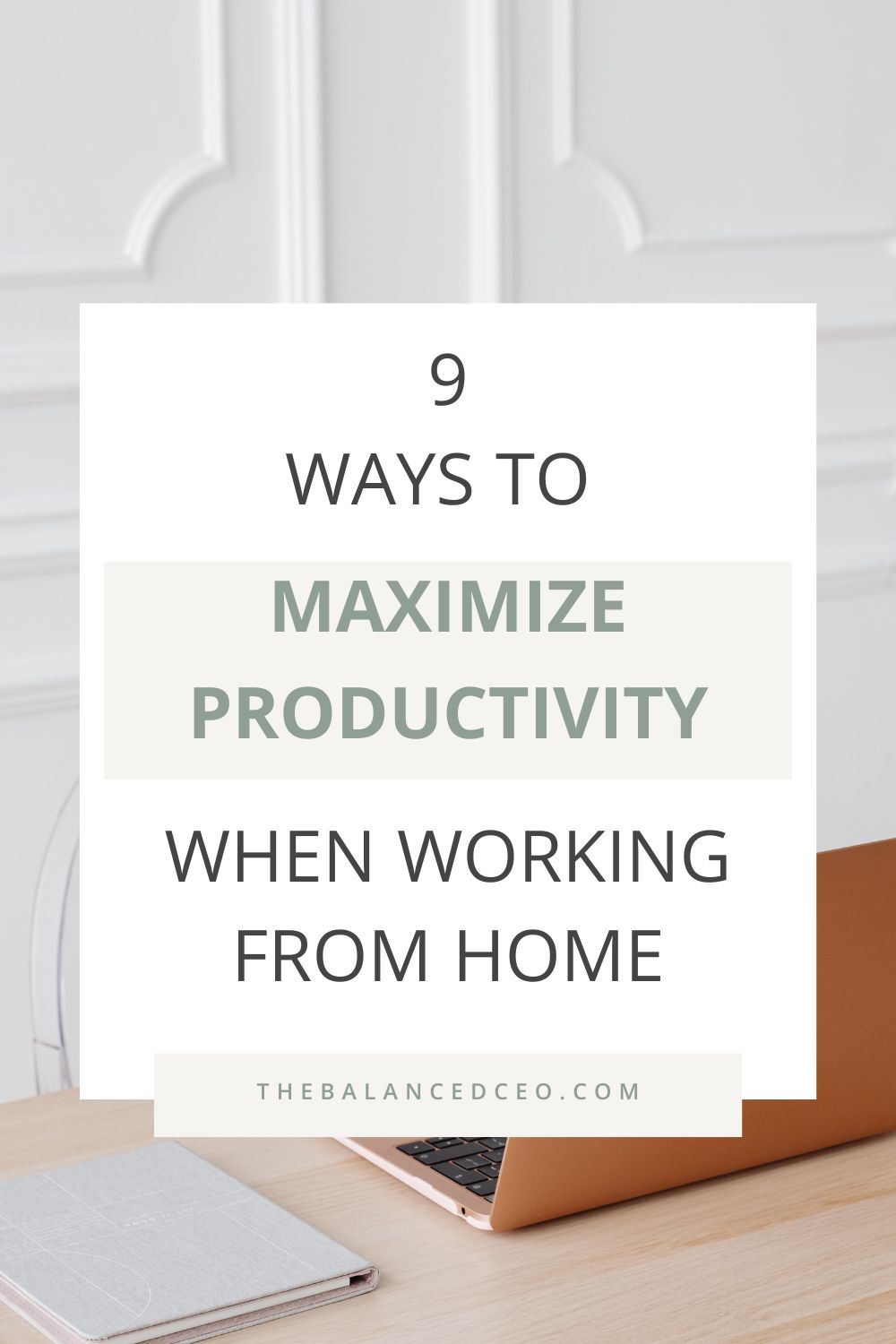This post may contain affiliate links, which means I’ll receive a commission if you purchase through my links, at no extra cost to you. Please read full disclosure for more information.

There are many perks to a work-from-home job, but working remotely also comes with challenges. Focusing and being productive in the same place you eat, sleep, and spend time with family and friends can be challenging. Here are nine ways to maximize productivity when working from home.
1. Put Your Phone in a Different Room
Smartphones are part of society. They keep us connected to family and friends. Phones can be a research tool and provide plenty of entertainment opportunities. While they are valuable tools, they can also significantly distract from work.
You could reach for your phone whether at home or in an office, but the pressures of someone seeing you on it can reduce your usage in a traditional office setting. You want to be on your phone infrequently, but if it is nearby, you’re more likely to answer a text message, check your emails or scroll through social media.
By placing your phone in a separate room, the common temptation to reach for it won’t be as strong.
2. Get Some Exercise
Work-from-home jobs are often computer-based, which means you spend a lot of time sitting to complete your tasks. When you don’t have much physical activity, it can harm your productivity by zapping your energy levels.
Exercising before or after work can improve your physical and mental health — helping you stay alert and focused. You can also exercise during your workday with under-desk equipment. Walk pads, miniature ellipticals, and stationary bikes are great options for providing movement while you work.
3. Eliminate Home Worries
There is always something to do at home. Whether it is laundry, meal prep, sweeping the floor, or putting things away, when you’re around other responsibilities, it can be hard to focus solely on your work.
Using systems to run your home efficiently is necessary if your mind wanders during the workday. Get into a home routine outside of your work hours, and implement systems to eliminate worries that may emerge.
Smart home tools can help you focus on your work while in your home. Automated systems can eliminate worries about not closing a door or leaving a light on. Virtual assistants or calendars can remind you to complete tasks after work so that you can focus your mental energy back on work.
4. Stick to a Schedule
A consistent work schedule can help you achieve a healthy work/life balance.
Just as you have set times to clock in and out of an office, do the same for your job, even if you have a flexible schedule. Doing so can help you focus on your work when you begin and walk away from it after you end.
Research shows that it’s harder for work-from-home employees to not think about work outside of hours. A schedule can make things easier. Ensure that you add breaks to your schedule.
Working for eight hours straight is daunting. Taking breaks to eat, relax and recharge through the day can help your flow and focus.
5. Follow the 20-20-20 Rule
Eye fatigue and strain are common in work-from-home situations. You can sit in front of the computer for hours, making it harder to concentrate as the day progresses.
The 20-20-20 Rule is a way to prevent eye strain by changing their focus. Every 20 minutes, look at something 20 feet away for at least 20 seconds. It gives your eyes a break from the close-up screen and expands your view.
Eye fatigue or strain puts physical and mental stress on your body, damaging your productivity.
6. Create a Designated Workspace
Having a dedicated place to do your work daily can help you feel more like you are at an office. It creates a space to zone out other distractions around the home. A home office and desk can help you create a work/life balance.
If you have children, roommates, or pets around your home, they can unintentionally pull you away from your work. They can throw off your schedule, making it harder to focus on the quality time you want to spend with them after hours. It doesn’t mean you can’t address necessary matters, but separating as much as possible helps you get your work done more efficiently.
Without a private office, consider setting up a space in a room each day that allows you to feel more like you are working.
7. Go Outside
Natural light can impact your physical and mental state. Getting outside for a few minutes on breaks or after work can affect how well you perform throughout the day.
Being in sunlight can reduce symptoms of mental health conditions and boost your mood and stress levels. Spending a couple of hours in the light each day can significantly decrease your risk of depression and increase your vitamin D levels — helping you be physically healthy.
If you have little time to go out, choose a spot to work around windows that can bring in sunlight.
8. Use a Productivity Tracker
Productivity trackers are excellent ways to hold yourself accountable throughout your work day. They can track your browser use to determine how often you focus on your work and how often you are away from the tools you use to perform your job.
It’s easy to let your eyes or mind wander to other topics of concern. Using it can help you identify which parts of the day you lose focus or your energy levels decrease. It can be essential information for planning your breaks and making necessary adjustments to boost productivity.
Review the tracker after each workday to see when you were most productive. Also, check it weekly or monthly to determine patterns you can work to improve.
9. Ask for Feedback
It can be difficult to know how your daily productivity aligns with company expectations when you work from home. To gauge your progress, you can ask for feedback during meetings. Your supervisor can give you suggestions for improvement, which may include participating more in online meetings and engaging more with the company.
Good communication is especially vital with a remote team. Face-to-face communication via an online call is an excellent way to strengthen your connection. If that’s not possible, consider asking for a phone call so you can use your tones of voice to understand one another better. While you chat, don’t be afraid to ask questions.
Improve Your Work-From-Home Productivity
Working from home can make separating your work life and your personal life difficult. These tips could help!

Cora Gold
Contributor
Cora Gold is the Editor-in-Chief of Revivalist magazine, a publication dedicated to happy, healthy, and mindful living.





Leave a Reply